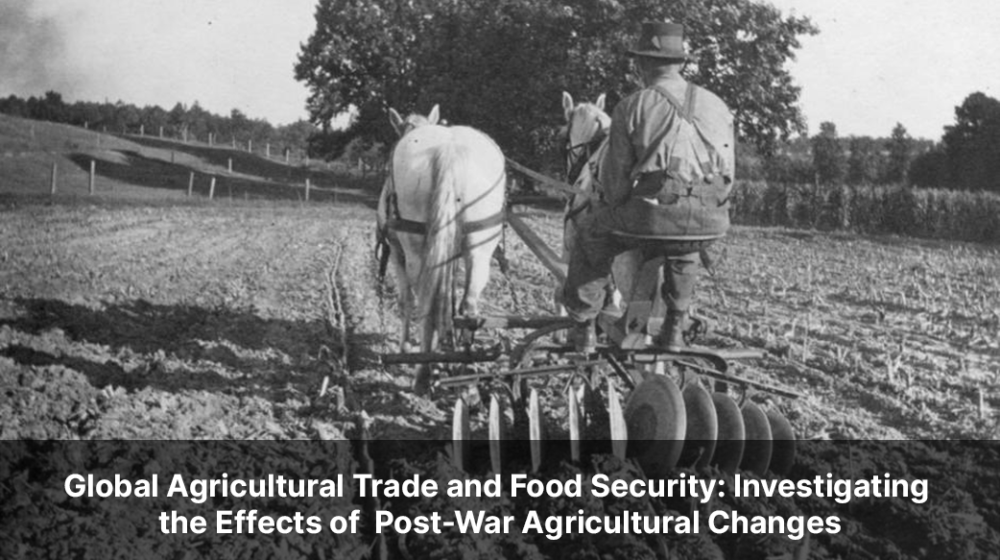In the aftermath of World War II, the global agricultural landscape experienced significant transformations that reshaped trade policies and had profound effects on food security worldwide. The emergence of international agricultural markets, accompanied by changes in trade policies, played a pivotal role in determining food availability, accessibility, and affordability. This article aims to explore the consequences of post-war agricultural changes on global trade and food security.
The devastation caused by the war prompted nations to prioritize rebuilding their economies, and agriculture became a critical focus. Many countries adopted strategies to increase agricultural productivity to meet rising demands and ensure food security for their populations. These efforts led to the development of new technologies, such as improved irrigation systems, mechanization, and the introduction of chemical fertilizers and pesticides. These innovations significantly boosted agricultural production, transforming the sector into a global powerhouse.
One of the key outcomes of post-war agricultural changes was the establishment of international agricultural markets. Nations realized the benefits of trade and began to specialize in the production of specific commodities suited to their climate, resources, and expertise. This specialization, coupled with advancements in transportation and communication, facilitated the growth of global agricultural trade. Countries started to import and export agricultural goods on a larger scale, leading to the emergence of complex trading networks.

Simultaneously, trade policies underwent significant transformations during this period. Nations sought to protect their domestic agricultural industries while promoting exports to bolster their economies. This led to the implementation of various trade policies, such as tariffs, subsidies, and import restrictions. While these measures aimed to support domestic farmers, they also had unintended consequences for global trade and food security.
One of the major effects of trade policies was the distortion of global agricultural markets. High tariffs and subsidies favored domestic producers, making imported agricultural goods less competitive. This protectionist approach often resulted in artificially inflated prices for consumers, limiting their access to affordable and nutritious food. Furthermore, import restrictions hindered the flow of agricultural goods, potentially exacerbating food shortages in countries heavily reliant on imports.
However, not all trade policies had negative consequences. Some nations implemented policies that promoted agricultural exports, enabling them to tap into international markets and boost their economies. Export-oriented agricultural production provided countries with opportunities for economic growth and foreign exchange earnings. This, in turn, could contribute to improving food security by generating income that could be invested in agricultural development and poverty alleviation.
The impact of post-war agricultural changes on food security varied across different regions. Developed countries with advanced agricultural sectors often benefited from their ability to produce surplus crops for export. However, developing countries faced challenges due to their reliance on agricultural imports and their vulnerability to price fluctuations in global markets. In some cases, the pursuit of self-sufficiency led to neglecting other aspects of food security, such as diversifying diets and investing in rural infrastructure and smallholder farmers.
To address the negative consequences of trade policies and promote food security, international organizations, such as the World Trade Organization (WTO), have played a crucial role. The WTO aims to establish fair trade practices and reduce trade barriers, ensuring that countries can access agricultural markets on equitable terms. Additionally, initiatives like the United Nations’ Sustainable Development Goals (SDGs) recognize the importance of promoting sustainable agriculture, investing in rural development, and enhancing global food security.
In conclusion, post-war agricultural changes had far-reaching effects on global trade and food security. The emergence of international agricultural markets, coupled with changes in trade policies, reshaped the global agricultural landscape. While trade policies aimed to protect domestic industries, they often distorted markets and hindered access to affordable food. Nonetheless, some countries leveraged trade opportunities to enhance their economies and improve food security. Moving forward, fostering equitable trade practices and promoting sustainable agriculture are essential for achieving global food security for all.
Efforts to mitigate the negative consequences of post-war agricultural changes and promote food security require a multifaceted approach. Firstly, it is essential to address trade barriers and promote fair trade practices. Reducing tariffs, subsidies, and import restrictions can enhance market access for agricultural goods, ensuring fair competition and affordable prices for consumers. International collaborations, such as bilateral and multilateral trade agreements, can facilitate this process and foster greater cooperation among nations.
Secondly, investing in agricultural research and development is crucial for increasing productivity and sustainability in the sector. Research institutions, governments, and international organizations should prioritize funding and support for innovative technologies, climate-smart practices, and improved infrastructure in agriculture. By enhancing productivity and resilience, countries can better cope with the challenges of fluctuating global markets and climate change impacts.
Furthermore, promoting inclusive agricultural policies that prioritize smallholder farmers and rural development is essential. Small-scale farmers make up a significant proportion of the global agricultural workforce, particularly in developing countries. Empowering them through access to credit, training, and resources can enhance their productivity and enable them to contribute more effectively to global food security.
Diversifying agricultural systems and diets is another critical aspect of addressing food security. Encouraging the production and consumption of a wide range of nutritious crops and promoting sustainable farming practices can enhance dietary diversity, improve nutrition, and reduce the reliance on a few staple crops. This approach can contribute to long-term food security by reducing vulnerability to crop failures and enhancing the resilience of agricultural systems.
Lastly, international cooperation and partnerships are vital for addressing the complex challenges of global agricultural trade and food security. Collaborative initiatives between governments, international organizations, NGOs, and the private sector can facilitate knowledge sharing, capacity building, and the implementation of effective policies and programs. By working together, stakeholders can pool resources, expertise, and innovative solutions to tackle the multifaceted issues surrounding global food security.
In conclusion, the effects of post-war agricultural changes on global trade and food security have been substantial. The emergence of international agricultural markets and changes in trade policies have shaped the availability, accessibility, and affordability of food worldwide. While trade policies have had both positive and negative consequences, promoting fair trade practices, investing in research and development, supporting smallholder farmers, diversifying agricultural systems and diets, and fostering international cooperation are key steps towards achieving global food security. By addressing these challenges collectively, we can strive towards a future where everyone has access to safe, nutritious, and affordable food.
